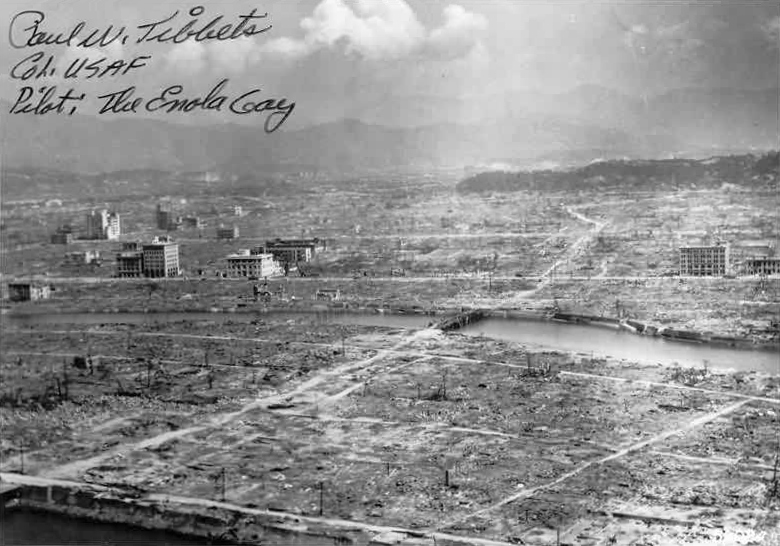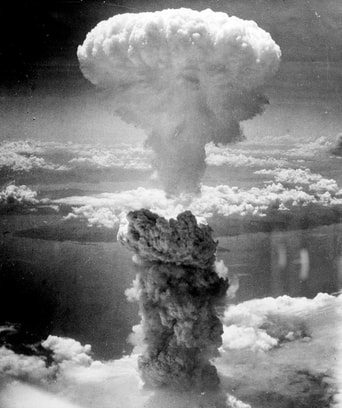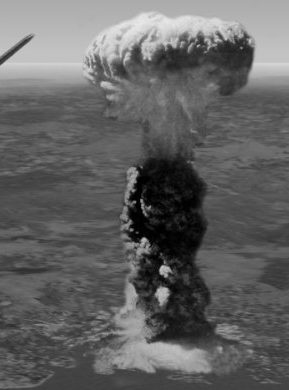Vegasgiants
Silver Member
- Apr 16, 2022
- 2,469
- 462
- 98
- Banned
- #5,001
Then lets get back to it. Or leaveI am looking, your post has nothing to do with bombs
Follow along with the video below to see how to install our site as a web app on your home screen.
Note: This feature may not be available in some browsers.
Then lets get back to it. Or leaveI am looking, your post has nothing to do with bombs

Yeah king is another one who came out against the bombs"Among the Navy brass, feelings ran strong against the bombings. Admiral Ernest King, the chief of naval operations, told his co-author that he did not like the atomic bomb “or any part of it,” and said that the air-sea blockade would have been enough to force a Japanese surrender. Several leading air commanders, including Generals Hap Arnold and Curtis LeMay, said that the atomic bombs were unnecessary because conventional bombing had already brought Japan to its knees. Remarks of this sort can be understood in the context of internal military politics and budgetary positioning. Yet it is clear that many military leaders thought the atomic bombings unjustified and even immoral. Admiral Bill Leahy, the senior most active-duty US officer of the Second World War, left a scathing passage in his memoir, charging that the United States had “adopted an ethical standard common to the barbarians of the Dark Ages. I was not taught to make war in that fashion, and wars cannot be won by destroying woman and children.”"

The Atomic Bombings by Ian W. Toll | The National WWII Museum | New Orleans
Many Americans greeted the news of the Atomic bombing of Hiroshima with jubilation. Beginning shortly after the war, however, a number of prominent US military leaders began to question the bomb's use.www.nationalww2museum.org
Eisenhower and Leahy must have been the most tedious whiners in human history."Among the Navy brass, feelings ran strong against the bombings. Admiral Ernest King, the chief of naval operations, told his co-author that he did not like the atomic bomb “or any part of it,” and said that the air-sea blockade would have been enough to force a Japanese surrender. Several leading air commanders, including Generals Hap Arnold and Curtis LeMay, said that the atomic bombs were unnecessary because conventional bombing had already brought Japan to its knees. Remarks of this sort can be understood in the context of internal military politics and budgetary positioning. Yet it is clear that many military leaders thought the atomic bombings unjustified and even immoral. Admiral Bill Leahy, the senior most active-duty US officer of the Second World War, left a scathing passage in his memoir, charging that the United States had “adopted an ethical standard common to the barbarians of the Dark Ages. I was not taught to make war in that fashion, and wars cannot be won by destroying woman and children.”"




 cnduk.org
cnduk.org

They are idiots then."Many historians have argued that the atomic bombing of Japan at the end of World War II was not necessary and unjustified. There have been several key reasons developed to support this position, such as:
- It was inhumane.
- It caused too much destruction.
- It killed too many innocent people, including children.
- It was unnecessary as Japan was essentially defeated.
- Japan was seeking surrender.
- It was not universally supported in the United States.
- The United States could have done something else.
- The United States should have waited longer between the two bombs.
- It was used more to scare the Soviet Union than to defeat Japan.
- It led to the modern atomic age and the threat of nuclear warfare."

Reasons Against the Atomic Bombing of Japan
Reasons Against the Atomic Bombing of Japan - The atomic bombing of Japan at the end of World War II by the United States is one of the most debated and controversial topics in all of history. Since the bombing in 1945, historians have debated whether orwww.historycrunch.com
ANOTHER idiotic article---as has been explained to you many times, Japan was not ready to surrender completely. They wanted to save face to fight another day---dropping the bombs ended their attacks on others.Hiroshima - the truth about the bombing - CND
Written by Kate Hudson The city of Hiroshima stands on a flat river delta on the Japanese island of Honshu. At quarter past eight on the morning of 6 August 1945, the US plane Enola Gay dropped an atomic bomb on the city centre, a busy residential and business district, crowded with people going...cnduk.org
Before the atomic bombs, Japan was not willing to surrender at all actually.ANOTHER idiotic article---as has been explained to you many times, Japan was not ready to surrender completely. They wanted to save face to fight another day---dropping the bombs ended their attacks on others.
The atomic bombings were entirely justified. Japan was refusing to surrender and we had every right to attack vital military targets."Many historians have argued that the atomic bombing of Japan at the end of World War II was not necessary and unjustified."
Not valid reasons."There have been several key reasons developed to support this position, such as:
- It was inhumane.
- It caused too much destruction.
- It killed too many innocent people, including children."
Fake news. Japan was refusing to surrender.
- "It was unnecessary as Japan was essentially defeated.
- Japan was seeking surrender."
LOL! That's no reason not to bomb military targets in an enemy nation that is refusing to surrender.
- "It was not universally supported in the United States.
- The United States could have done something else."
We waited too long between the atomic bombs actually.
- "The United States should have waited longer between the two bombs."
Fake news. The atomic bombs were used with the goal of making Japan surrender (which they were then refusing to do).
- "It was used more to scare the Soviet Union than to defeat Japan."
That's a good thing.
- "It led to the modern atomic age and the threat of nuclear warfare."
They did not have the power to outlaw bombing military objectives from the air."On September 39, 1938, the League of Nations, “under the recognized principles of international law,” issued a unanimous resolution outlawing the intentional bombing of civilian populations, with special emphasis against bombing military objectives from the air. The League warned, “Any attack on legitimate military objectives must be carried out in such a way that civilian populations in the neighborhood are not bombed through negligence.” Significantly, the resolution also reaffirmed that “the use of chemical or bacterial methods in the conduct of war is contrary to international law.” In other words, a special category of illegal weapons had been recognized, a category today called Weapons of Mass Destruction (WMD)."
Fake news. Never happened."Walter Trohan, a reporter for the Chicago Tribune with impeccable credentials for integrity and accuracy, reported that two days before President Roosevelt left for the Yalta conference with Churchill and Stalin in early February 1945, he was shown a forty-page memorandum drafted by General MacArthur outlining a Japanese offer for surrender almost identical with the terms subsequently concluded by his successor, President Truman. The single difference was the Japanese insistence on retention of the emperor, which was not acceptable to the American strategists at the time, though it was ultimately allowed in the final peace terms. Trohan relates that he was given a copy of this communication by Admiral Leahy who swore him to secrecy with the pledge not to release the story until the war was over. Trohan honored his pledge and reported his story in the Chicago Tribune and the Washington Times-Herald on August 19, 1945. According to historian Anthony Kubek, Roosevelt, in the presence of witnesses, read the memorandum and dismissed it with a curt "MacArthur is our greatest general and our poorest politician."
Do I smell a whiff of Gar Alperovitz lies?"Hiroshima was chosen as the primary target since it had remained largely untouched by bombing raids, and the bomb's effects could be clearly measured. While President Truman had hoped for a purely military target, some advisers believed that bombing an urban area might break the fighting will of the Japanese people."
Fake news. That article is filled with many outright lies.Hiroshima - the truth about the bombing - CND
Written by Kate Hudson The city of Hiroshima stands on a flat river delta on the Japanese island of Honshu. At quarter past eight on the morning of 6 August 1945, the US plane Enola Gay dropped an atomic bomb on the city centre, a busy residential and business district, crowded with people going...cnduk.org
There are a number of things that I like about that article, but it does contain a few falsehoods.
The Bureaucrats Who Singled Out Hiroshima for Destruction
How committee meetings, memos, and largely arbitrary decisions ushered in the nuclear agewww.theatlantic.com
Fake news. Never happened.Aug 14, 1965, page 1 - Chicago Tribune at Newspapers.com - Newspapers.com
View the digital scanned newspaper from Chicago Tribune dated Aug 14, 1965, page 1.www.newspapers.com
^^^Aug 14, 1965, page 1 - Chicago Tribune at Newspapers.com - Newspapers.com
View the digital scanned newspaper from Chicago Tribune dated Aug 14, 1965, page 1.www.newspapers.com
^^^Hiroshima - the truth about the bombing - CND
Written by Kate Hudson The city of Hiroshima stands on a flat river delta on the Japanese island of Honshu. At quarter past eight on the morning of 6 August 1945, the US plane Enola Gay dropped an atomic bomb on the city centre, a busy residential and business district, crowded with people going...cnduk.org
^^^
The Bureaucrats Who Singled Out Hiroshima for Destruction
How committee meetings, memos, and largely arbitrary decisions ushered in the nuclear agewww.theatlantic.com
Fake news. Never happened.Aug 14, 1965, page 1 - Chicago Tribune at Newspapers.com - Newspapers.com
View the digital scanned newspaper from Chicago Tribune dated Aug 14, 1965, page 1.www.newspapers.com
Fake news. This article is filled with many outright lies.Hiroshima - the truth about the bombing - CND
Written by Kate Hudson The city of Hiroshima stands on a flat river delta on the Japanese island of Honshu. At quarter past eight on the morning of 6 August 1945, the US plane Enola Gay dropped an atomic bomb on the city centre, a busy residential and business district, crowded with people going...cnduk.org
There are a number of things that I like about this article (it clearly states Nagasaki's role in constructing large warships), but it does contain a few falsehoods.
The Bureaucrats Who Singled Out Hiroshima for Destruction
How committee meetings, memos, and largely arbitrary decisions ushered in the nuclear agewww.theatlantic.com